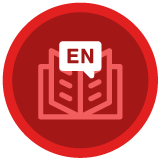Present tenses and the different information that can be transmitted with them.
Questions in present simple
Present simple for general states and descriptions
Present continuous: expressing lasting actions
Quiz: Present tenses and the different information that can be transmitted with them.
Past tenses and the differences among them.
Past simple: finished actions in past
Past continuous: ongoing actions that get interrupted
Quiz: Past tenses and the differences among them.
Talking about the future and constructions with Will.
Future simple with be + going to
Future simple with will
Conditional forms emphasizing type 1 (if + present simple, results with will, might, may)
Quiz: Talking about the future and constructions with Will.
To review the different forms of verbs (Regular, regular and non personal forms)
Regular and irregular verbs
Focus on present perfect for experiences
Present perfect continuous: structure and use
Past perfect: structure and use
Quiz: To review the different forms of verbs (Regular, regular and non personal forms)
Modal Verbs and Phrasal Modals: expressing obligation, prohibition and advice
Modal verbs for recommendations
Modal verbs for obligations
Phrasal modals: types and use
Quiz: Modal Verbs and Phrasal Modals: expressing obligation, prohibition and advice
Constructions with adjectives and prepositions: Comparisons and Phrasal Verbs
Adjective comparisons: as
Phrasal verbs: constructions and possibilities
Phrasal verbs: constructions and possibilities part 2
Quiz: Constructions with adjectives and prepositions: Comparisons and Phrasal Verbs
Emphasis on Past: Use of Past Modals and Past Habits
Past modals: should have
Past modals: would have
Past habits: used to
Past habits: would
Quiz: Emphasis on Past: Use of Past Modals and Past Habits
Conclusion
Summary and conclusions
Create your cover letter
Tell us what you learned in the course
So, you have made it this far into the course. It is time to create something on our own, something that will be helpful for the future. Most universities and most job positions will require you to present, in a written form, the reasons why you should be considered. This kind of document is called a cover letter and it is used as a way to complement your CV and provide explanations or expand on the information provided on it.
...
Cadastre-se ou faça login para ler o conteúdo completo.
Contribuições 0
Perguntas 0

Quer ver mais contribuições, perguntas e respostas da comunidade?